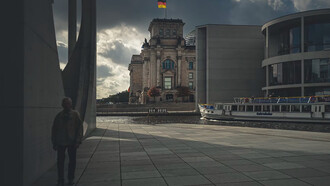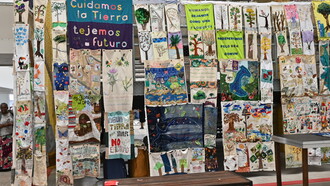The biggest obstacle to the existence of true democracy in Tunisia has always been the presence of the Muslim Brotherhood, political Islam.
By their actions, since the end of the 1970s, they have caused the Bourguiba regime to harden, to shut down, to reject democracy and the liberation of freedoms. Because every time, with their attempts at a military coup, using violence, terrorism, throwing acid in girls' faces, using Molotov cocktails, burning party headquarters, blowing up hotels, killing innocent people, even burning people alive, they closed any possibility of dialogue and democratic opening.
Therefore, the return of religion to the political sphere, political Islam, cannot be supported by an abstract concept of democracy, as some circles, including left-wing ones, and Islamist circles, want to promote. Political Islam is instead a support for the application of the shari'a and the establishment of an Islamic state, synonymous with religious radicalism, the antithesis of democracy.
The main mistake is not to understand a phenomenon that is not democratic because of its authoritarian roots. While claiming to have adopted a moderate Islamic reading, parties such as Ennahda (Renaissance Movement), created illegally in Tunisia in 1981 on the remains of the Muslim Brotherhood under an initial name of 'Movement of Islamic Tendency', show an impressive continuity of political line and leadership, and has never ceased to maintain links with jihadist branches.
It is therefore a real oxymoron, a contradiction in terms, to consider political Islam within the framework of democracy.
In these 10 years, that same terrorist group of the 1970s has become more dangerous than ever, voracious, well-organised, and has managed to control Tunisia thanks to foreign financial and logistical support, from Qatar and Turkey in the first place, and with Western political backing.
To stay in power, the Islamists not only rely on religion, but also use threats, physical violence, terrorist attacks, economic terrorism, and the bogeyman of economic sanctions. Relying on international 'democratic' lobbying, they are in fact ready to desecrate the country's sovereignty in order to seek help abroad by demanding to take back parliament, the source of their power. In fact, a few weeks ago, they even called for the suspension of American aid to Tunisia in the framework of the fight against Covid-19, since, according to them, the country was shaken by the 'coup d'état' of the President of the Republic Kaies Saied on 25 July. They called for democracy, which they oppose, heedless of sacrificing the lives of Tunisian citizens, ready to destroy what remains of Tunisia and starve Tunisians devastated by the health crisis, on the altar of their parties' interests.
To maintain their power, they persecute by all means those who oppose their mafia policy. They have even set up a virtual militia of mercenary web influencers, a reality that can no longer be denied, scavengers who feed on the destruction of all those who dare to oppose them and their destructive and retrograde ideology. There are countless cases of lynch mobs on social networks, from Facebook to radio and television, who bribe to continue instilling their lies and poison.
On top of this, in order to offer religious legitimacy to the political stance of the Islamic parties, the International Union of Muslim Ulemas, which supports the Taliban movement, and is the motherhouse of Tunisian Islamists, issued a fatwa on July 26th, describing Saied's decisions as an "unforgivable criminal act" that "undermines the institutions", calling for support for the deposed Tunisian government.
Many people wonder why American senators and deputies from certain European countries, usually very attentive to respect secular rights and freedoms and against violence in their countries, show unjustifiable solidarity with the Islamists, calling, in the name of abstract democracy, for the return to power of the very Islamists who are fighting democracy, the same ones who have brought our country to its knees.
Yet the closure of parliament and the overthrow of their government had been expected by the vast majority of the country for years. Voices were raised from many quarters against their way of operating with total impunity, infiltrating the administration, the judiciary and the business world, often with illegal lucrative activities. It was no longer possible to watch an entire country being taken hostage by a corrupt gang that violates laws on a daily basis. Since 2011, there have been dangerous waves of repression, while the economic, health and social crisis has only worsened, causing the impoverishment not only of the working class but also of the middle class, the violation of human, social and environmental rights, waves of evictions, corruption, terrorism, the violence of all kinds, especially against women, journalists and the police themselves.
This is the profound evil that drives thousands of Tunisians to emigrate, especially the young and very young, who prefer to risk crossing the Mediterranean on small boats rather than continue in the agony of being without work or a future.
They, the enriched business-political Islam, did not see that the crisis, caused by them, was so generalised that the 25 July demonstrations against their Islamist regime were the logical consequence.
Today we are deciding between living or dying. So, if Tunisians say they are happy with the decisions of the president of the republic, so be it. But the president will not be able to do anything without consulting and working hand in hand with the country's organisations and social movements.
He had asked for a month to clean up the country, and it has now been more than two months. The wait for a decisive change on his part has become very pressing, and the lack of decisions has become suffocating. There are no decisions to combat poverty and the unequal distribution of wealth or to straighten out the economy. Individuals, families and businesses that have suffered violations, violence, murders, fraud, theft and abuses punishable by law complain that justice is not being done to them, leaving the mercenaries and mafias of the Islamists and their allies unpunished. It is clear to everyone that, until now, justice has not been served despite the investigations into the murders, including those of the progressive leaders - they lynched Lotfi Nagdh to death, they shot and killed Chokri Belaid and Mohamed Brahmi - into the soldiers who were beheaded in the terrorist ambushes in the mountains, into the girls lured into so-called Halel prostitution, into the recruitment of young people sent to fight in the jihad in Afghanistan, Libya, Syria and now back home, future time bombs. Nothing about jihadist sleeper cells, nothing about the secret armed cell of Islamists, no closure order, until today, of the Tunisian section of the International Union of Muslim Ulemas, which, far from the limelight, has not stopped organising training cycles for shari'a preachers. Despite its classification in 2017 as a terrorist organisation by Egypt, Saudi Arabia and the United Arab Emirates, and despite numerous petitions and demonstrations, in Tunisia, denouncing the danger it poses in recruiting young people and their dogmatisation, and calling for its closure, it has continued to recruit young and unemployed people. No proceedings have been taken against its founders, members and teachers, a real danger to the Tunisian people and the sovereignty of Tunisia. On the contrary, thanks to foreign funding it is about to open branches in Sfax, Kairouan and Gafsa.
Nothing, not a single file has been opened or sent to the courts so that justice can be done.
On 25 July, President Kaies took over all powers at once: the legislative, the executive and the judiciary. It must mean something if the vast majority of the population considers that it is better this way, rather than being ruled by Islamists, by their power expressed by nepotism, corruption, banditry, enjoying impunity.
Now, finally, he has appointed the prime minister, she, since, for the first time, a woman is at the head of the government, a surprise for many, because he comes from a "conservative" background. Najla Bouden is known to be rigorous and has an impressive track record.
Her success will depend above all on fielding a team that will have to be excellent, competent and united, on a programme that responds to the expectations and emergencies of the country, with deadlines to be met, on her ability to be a strategist, on her skill, strength and perseverance in resolving urgent issues, and on a great deal of openness and diplomacy in dealing with the trade unions and social organisations.
Will civil society organisations and social movements, which in the past have shown themselves to be strong and well organised, be able to oversee this new development and support the changes to which she has been appointed and on which she must commit herself?
All are convinced that there is no time to lose, and that the slightest misstep could jeopardise the struggles and successes achieved in these 10 years. A risk that, it is denounced by many, even concerns the conquests obtained with independence in 1956, if Tunisia were to fall under the control of countries that, like Turkey and Qatar, behind, not even so covertly, political Islam.
There can be no democracy without rights and freedoms, especially of women, and there can be no social justice without equality, dignity, real equality of opportunity and fair distribution of wealth.
Will Najla Bouden be able to respond to the challenge of the decisive historical turning point that Tunisia is experiencing?















